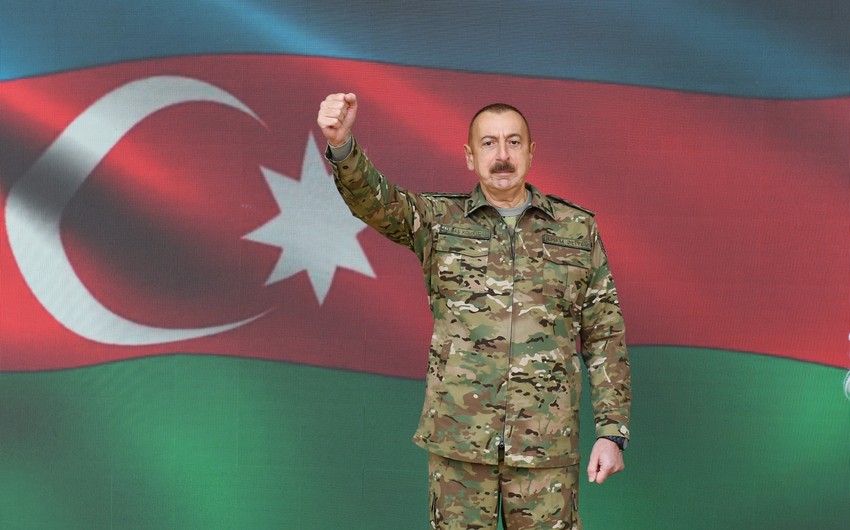Today marks three years since Armenia signed the act of capitulation, realizing its defeat in the Second Karabakh War.
The document was signed by the Prime Minister of Armenia, Nikol Pashinyan. Thus, on September 27, 2020, the brave Azerbaijani Army, under the leadership of Victorious Supreme Commander-in-Chief Ilham Aliyev, launched a counteroffensive for the liberation of lands held under Armenian occupation for nearly 30 years. Counter-offensive operations against Armenia's military provocations were launched in all directions at that time.
During the war, the Azerbaijani Army liberated its lands from the enemy village by village and city by city. The enemy, who occupied the ancient lands of Azerbaijan and expelled the Azerbaijanis living in these lands from their ancestral lands, was destroyed on the battlefield. The surviving militants were expelled from Azerbaijani lands. Every day, joyful news came from the front, which was reported to the people by the Supreme Commander-in-Chief, President Ilham Aliyev.
The Azerbaijani servicemen, who achieved new victories every day, not only destroyed the Armenian occupiers and drove them out of Azerbaijani lands, but also began to use the military equipment and ammunition seized from the enemy as booty against the Armenians themselves. The heroism and bravery shown by the Azerbaijani Army on the battlefield shook the enemy. Therefore, the Armenian servicemen, unable to stand up to this heroism, began to flee not only from the battlefield but also from the army. That is why the number of fugitives in the Armenian army in the Second Karabakh War was tens of thousands.
The liberation of several settlements by the Azerbaijani army on the first day of hostilities caused panic and fear among the enemy's personnel. The enemy soldiers, who were destroyed at every step, saw the way out only in retreat, and the survivors tried to save their lives.
During the 44-day fighting, 5 cities, 4 settlements, and 286 villages were liberated. Thus, Jabrayil city and 90 villages of the region, Fuzuli city and 53 villages of the region, Zangilan city, Minjivan, Agband, Bartaz settlements and 52 villages of the region, Hadrut settlement and 35 villages of Khojavand region, 3 villages of Tartar region, Gubadli city and 41 villages of the region, 9 villages of Khojaly region, Shusha city, several villages of Lachin region, as well as several strategic heights in the direction of Aghdara and Murovdagh, and in Zangilan Bartaz, Sigirt, Shukurataz heights and 5 more unnamed heights were liberated.
The liberation of Shusha by the Azerbaijani Army on November 8 resulted in the actual defeat of the enemy. Seeing the depletion of both personnel and military equipment and ammunition, the Armenian military-political leadership realized its defeat and agreed to sign a ceasefire document. Thus, the brave Azerbaijani Army, under the leadership of Victorious Supreme Commander-in-Chief, President Ilham Aliyev, forced Armenia to sign an act of capitulation.
On November 10, the President of Azerbaijan, Ilham Aliyev, the Prime Minister of Armenia, Nikol Pashinyan, and the President of Russia, Vladimir Putin, signed a statement on a complete cessation of ceasefire and all military operations in the conflict zone. This put an end to the Armenian-Azerbaijani Nagorno-Karabakh conflict. According to the statement, the Aghdam, Kalbajar, and Lachin districts were peacefully returned to Azerbaijan.
Initially, the statement was expected to be signed by the presidents of the three countries via video conference. However, later, the Prime Minister of Armenia, Nikol Pashinyan, refused to sign the trilateral statement in front of the world community. He secretly signed the act of capitulation for his country.
However, Armenia did not fulfill its obligations in the document it signed. Thus, the tripartite statement of November 10, 2020, clearly states that Armenia must withdraw its forces from Karabakh in parallel with the deployment of Russian peacekeepers. However, Armenia continued to support illegal military formations in the sovereign territory of Azerbaijan for about three years. Moreover, the positions of the Azerbaijani Army were being systematically fired at by the illegal Armenian armed forces in the Karabakh region of Azerbaijan, the territories were being mined, and various provocations were being committed.
Taking these into account, on September 19 of this year, local anti-terrorist measures were launched in the region in order to ensure the provisions of the Trilateral Declaration, prevent large-scale provocations in the Karabakh economic region, disarm and withdraw the Armenian armed forces units from our territories, neutralize their military infrastructure, ensure the safety of civilians returning to the liberated territories and the civil workers and military personnel involved in the reconstruction work, and restore the constitutional structure of the Republic of Azerbaijan.
During the measures that lasted for a little more than 23 hours, the positions of the Armenian armed forces on the front line and in-depth and long-term firing points, as well as combat vehicles and military objects were destroyed by the use of high-precision weapons. The enemy raised a white flag. With this, the constitutional structure was restored in all territories of Azerbaijan.
On October 15, the head of state visited Khankandi city, Khojavand, Shusha, Khojaly, Aghdara districts, and the Asgaran fortress and raised the Azerbaijani flag there.
At present, the glorious tricolor flag of Azerbaijan is waving everywhere in Karabakh.


 https://static.report.az/photo/e4fe8c29-449c-3ecf-90c7-ac7c9f99b7a2.jpg
https://static.report.az/photo/e4fe8c29-449c-3ecf-90c7-ac7c9f99b7a2.jpg

